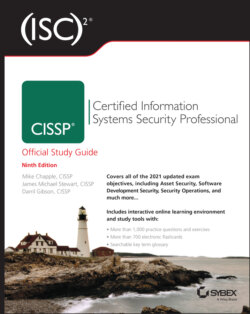Читать книгу (ISC)2 CISSP Certified Information Systems Security Professional Official Study Guide - Mike Chapple - Страница 48
Evaluate and Apply Security Governance Principles
ОглавлениеSecurity governance is the collection of practices related to supporting, evaluating, defining, and directing the security efforts of an organization. Optimally, security governance is performed by a board of directors, but smaller organizations may simply have the chief executive officer (CEO) or chief information security officer (CISO) perform the activities of security governance. Security governance seeks to compare the security processes and infrastructure used within the organization with knowledge and insight obtained from external sources. This is why a board of directors is often composed of people from a wide range of backgrounds and industries. The board members can bring their varied experience and wisdom to provide guidance for improvement to the organization they are overseeing.
Security governance principles are often closely related to and often intertwined with corporate and IT governance. The goals of these three governance agendas are often the same or interrelated, such as maintaining business processes while striving toward growth and resiliency.
Some aspects of governance are imposed on organizations due to legislative and regulatory compliance needs, whereas others are imposed by industry guidelines or license requirements. All forms of governance, including security governance, must be assessed and verified from time to time. Various requirements for auditing and validation may be present due to government regulations or industry best practices. This is especially problematic when laws in different countries differ or in fact conflict. The organization as a whole should be given the direction, guidance, and tools to provide sufficient oversight and management to address threats and risks, with a focus on eliminating downtime and keeping potential loss or damage to a minimum.
As you can tell, the definitions of security governance are often rather stilted and high level. Ultimately, security governance is the implementation of a security solution and a management method that are tightly interconnected. Security governance directly oversees and gets involved in all levels of security. Security is not and should not be treated as an IT issue only. Instead, security affects every aspect of an organization. Security is a business operations issue. Security is an organizational process, not just something the IT geeks do behind the scenes. Using the term security governance is an attempt to emphasize this point by indicating that security needs to be managed and governed throughout the organization, not just in the IT department.
There are numerous security frameworks and governance guidelines, including National Institute of Standards and Technology (NIST) SP 800-53 and NIST SP 800-100. Although the NIST guidance is focused on government and military use, it can be adopted and adapted by other types of organization as well. Many organizations adopt security frameworks in an effort to standardize and organize what can become a complex and bewilderingly messy activity, namely, attempting to implement reasonable security governance.
